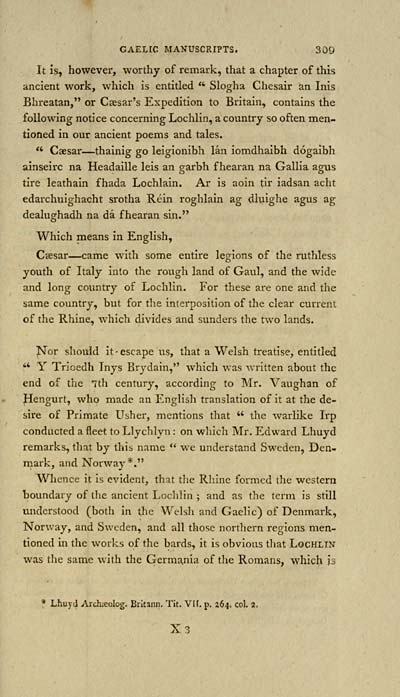J. F. Campbell Collection > Report of the Committee of the Highland Society of Scotland, appointed to inquire into the nature and authenticity of the poems of Ossian
(493)
Download files
Complete book:
Individual page:
Thumbnail gallery: Grid view | List view

GAELIC MANUSCRIPTS. 309
It is, however, worthy of remark, that a chapter of this
ancient work, which is entitled " Slogha Chesair an Inis
Bhreatan," or Caesar's Expedition to Britain, contains the
following notice concerning Lochlin, a country so often men-
tioned in our ancient poems and tales.
" Caesar — thainig go leigionibh Ian iomdhaibh dogaibh
ainseirc na Headaille leis an garbh f hearan na Gallia agus
tire leathaln fhada Lochlain. Ar is aoin tir iadsan acht
edarchuighacht srotha Rein roghlain ag dluighe agus ag
dealughadh na da fhearan sin."
Which means in English,
Caesar — came with some entire legions of the ruthless
youth of Italy into the rough land of Gaul, and the wide
and long country of Lochlin. For these are one and the
same country, but for the interposition of the clear current
of the Rhine, which divides and sunders the two lands.
Nor should it -escape us, that a Welsh treatise, entitled
u Y Trioedh Inys Brydain,*' which was written about the
end of the Tth century, according to Mr. Vaughan of
Hengurt, who made an English translation of it at the de-
sire of Primate Usher, mentions that '' the warlike Irp
conducted a fleet to Llychlyn : on wliich Mr. Edward Lhuyd
remarks, that by this name " we understand Sweden, Den-
mark, and Norway*."
Whence it is evident, that tlie Rhine formed the western
boundary of the ancient Lochlin ; and as the term is still
understood (both in the Welsli and Gaelic) of Denmark,
Norvv^ay, and Sweden, and all those northern regions men-
tioned in the works of the bards, it is obvious that LocHLiN
was the same with the Germania of the Romans, which is
Lhuyd Archxolog. Britann. Tit. VI f. p. 264. col. 2.
X3
It is, however, worthy of remark, that a chapter of this
ancient work, which is entitled " Slogha Chesair an Inis
Bhreatan," or Caesar's Expedition to Britain, contains the
following notice concerning Lochlin, a country so often men-
tioned in our ancient poems and tales.
" Caesar — thainig go leigionibh Ian iomdhaibh dogaibh
ainseirc na Headaille leis an garbh f hearan na Gallia agus
tire leathaln fhada Lochlain. Ar is aoin tir iadsan acht
edarchuighacht srotha Rein roghlain ag dluighe agus ag
dealughadh na da fhearan sin."
Which means in English,
Caesar — came with some entire legions of the ruthless
youth of Italy into the rough land of Gaul, and the wide
and long country of Lochlin. For these are one and the
same country, but for the interposition of the clear current
of the Rhine, which divides and sunders the two lands.
Nor should it -escape us, that a Welsh treatise, entitled
u Y Trioedh Inys Brydain,*' which was written about the
end of the Tth century, according to Mr. Vaughan of
Hengurt, who made an English translation of it at the de-
sire of Primate Usher, mentions that '' the warlike Irp
conducted a fleet to Llychlyn : on wliich Mr. Edward Lhuyd
remarks, that by this name " we understand Sweden, Den-
mark, and Norway*."
Whence it is evident, that tlie Rhine formed the western
boundary of the ancient Lochlin ; and as the term is still
understood (both in the Welsli and Gaelic) of Denmark,
Norvv^ay, and Sweden, and all those northern regions men-
tioned in the works of the bards, it is obvious that LocHLiN
was the same with the Germania of the Romans, which is
Lhuyd Archxolog. Britann. Tit. VI f. p. 264. col. 2.
X3
Set display mode to: Large image | Transcription
Images and transcriptions on this page, including medium image downloads, may be used under the Creative Commons Attribution 4.0 International Licence unless otherwise stated. ![]()
| Permanent URL | https://digital.nls.uk/81748169 |
|---|
| Description | Volumes from a collection of 610 books rich in Highland folklore, Ossianic literature and other Celtic subjects. Many of the books annotated by John Francis Campbell of Islay, who assembled the collection. |
|---|
| Description | Selected items from five 'Special and Named Printed Collections'. Includes books in Gaelic and other Celtic languages, works about the Gaels, their languages, literature, culture and history. |
|---|

